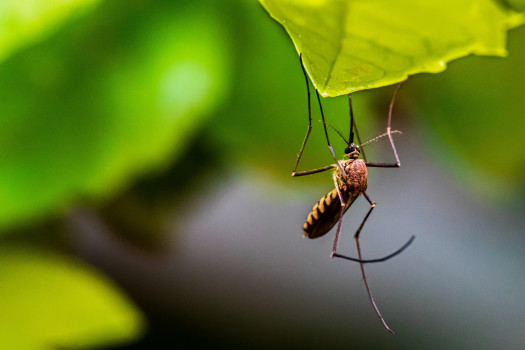Pandemics & Infectious Diseases
Terresterial Biodiversity
Zoonose & Vector Borne Diseases
AXA Chairs
Ireland
Fighting malaria and preserving biodiversity in Africa: a non-zero-sum game
Recognizing the pivotal role played by environmental heterogeneities in both these adaptations by mosquitoes, Professor Killeen is leading a research program to characterize the opportunities and obstacles that arise from biodiversity conservation efforts in Africa. The overall objective is to bring the fight against malaria one step closer to eradication, while fostering improved management of wildlife areas.
Not all mosquitoes behave in the same way. Malaria vectors exhibit a remarkable “phenotypic plasticity”, meaning they have the ability to adapt their phenotypes (or observable traits) to local environmental conditions. This entails different host-seeking, resting and oviposition behaviours, that vary according to the opportunities presented to them. Since the rapid scale-up of ITNs, many species of the most important vector mosquitoes with the strongest preference for human blood have disappeared from large tracts of Africa. “Unfortunately, not all of them are as suicidal as we would wish, jokes Professor Killeen, who helped shape the original shift in WHO policy towards the current goal of universal coverage with ITNs. Some feed on humans outdoors, while others exploit cattle or their wild relatives as alternative sources of blood, thereby evading interventions targeted to humans or livestock. These behaviours may make it particularly difficult to eliminate malaria from many parts of Africa where humans and wildlife co-exist”. Paradoxically though, the Professor Killeen hypothesizes that the proximity of wild animals, by creating refuges for mosquitoes against insecticide pressure, may help prevent the irreversible spread of insecticide resistance. According to WHO, resistance has been detected in all major vector species and against all available classes of insecticides. Malaria-endemic countries are urged to draw up and implement comprehensive insecticide-resistance management strategies, and to ensure timely entomological surveillance, including resistance monitoring. “Conservation areas with high density and diversity of wild animals may provide mosquitoes with refugia against insecticide pressure, proposes Professor Killeen. They may therefore be vital to re-establishing pyrethroid susceptibility and responsiveness traits among vector populations in human-settled areas”.
Portfolio effects: when financial theory applies to ecology
These complex interactions between vector biodiversity, behavioural plasticity and environmental resource distribution heterogeneities have led the chairholder and Dr Tom Reed, one of his colleagues at UCC, to turn to the portfolio effect as a conceptual framework for analysis. Recognizing the similarities between stable biological systems and robust financial portfolios, Dr Reed and some of his fellow conservation biologists recently adapted this probability theory framework to describe complex ecosystems. “In simple terms, diversification stabilizes investment portfolios through statistical averaging of individual asset dynamics that often correlate weakly or negatively with each other. The same simple probability theory applies equally well to complex ecosystems, which are buffered against perturbations by biological and environmental diversity.” Building on that theoretical approach, the aim of Professor Killeen’s new research program is to demonstrate that portfolio effects, can be further bolstered by wildlife conservation in protected areas. “Existing tools are insufficient to eradicate malaria. We need to go further and think of interventions that actively reach the mosquitoes wherever they are, rather than just passively protect vulnerable humans. To do this, we need to better understand the complex ecosystem in all areas where malaria subsists, and that ultimately brings us to the study of mosquito ecology in conservation areas”. The chairholder is particularly interested in Wildlife Management Areas (WMAs) in Tanzania, where he has been based at the Ifakara Health Institute (IHI) for the last 17 years. In Tanzania, where the research project will be carried out in partnership with IHI, these protected areas located at the fringes of human settlements allow communities to benefit from their local wildlife while also taking an active part in conservation, and they act as buffer zones around much larger, more rigorously-protected areas like parks and reserves. “These transitional conservation areas are grossly understudied, and their potential is far from fully exploited. Simply by doing research there, we hope to both enhance the protection and utility of these areas, while also protecting humans from the pathogens and vectors that live there.”
By taking a comprehensive approach to vector diversity and the highly variable ecosystems they inhabit, the present Chair program addresses two of WHO’s urgent malaria concerns: the insufficiency of current malaria vector-control measures, and the urgent need for implementation of comprehensive insecticide-resistance management strategies. In addition, the funding scheme of the AXA Chair will allow the project to be very interactive and collaborative, supporting Dr. Killeen in his remarkable efforts to develop fellowships for young African researchers, and work hand in hand with local community-based organizations and their supporting national research institutions.
• Researcher's profile
• Watch the webinar "A global perspective on tackling COVID-19 now and preventing further pandemics in the future" presented by Prof Gerry Killeen in June 2020.
Launch of the AXA-UCC Chair to fight malaria at University College Cork
Read the article

Gerry F.
KILLEEN
Institution
University College Cork
Country
Ireland
Nationality
Republic of Ireland
Related articles
Medical Treatment & Drug Development
Terresterial Biodiversity
Agriculture, Crops & Soil Health
Biotech- and Nanotechnology
Insects & Microorganisms
Vaccines
Post-Doctoral Fellowship
Argentina
Harmless and Eco-Friendly Solution as an Alternative to Replace Synthetic Agrochemicals
Agrochemicals were introduced to protect crops from pests and enhance crop yields. However, they have become a long-standing concern due... Read more

Johan
RODRIGUEZ MELO

